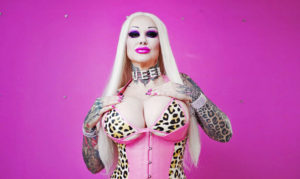If societal mores are designed for the comfort and prosperity of human beings, they are also necessarily designed to restrict the movement of human bodies. Some of these constraints seem only fair, and even intuitive: don’t step on people’s toes, keep your saliva inside your mouth, refrain from farting in elevators. After all, our bodies — precious vehicles that contain all we are and move us safely through the world — are machines possessed of various functions, fluids and pointy bits that other people would rather not have in their laps.
But when that body is also fat, the question of how to constrain it for the sake of other people’s comfort becomes fraught — not only for the person who lives in it. And now, amid the usual spate of New-Year-new-you books aimed at teaching overweight people to accept their bodies, or starve their bodies, or sculpt their bodies, comes another idea entirely. “I believe that when it comes to fatphobia, the solution is not to improve our self-image or love our bodies better,” writes Kate Manne in the introduction to her new book, Unshrinking. “It is nothing less than to remake the world to properly fit fat bodies, and to effect the socially transformative recognition that there is truly nothing wrong with us.”
Before we get to the question of how, exactly, such a remaking would take place, it’s important to acknowledge what Unshrinking is — not a science book, but also not exactly self-help, since Manne’s central thesis is that helping yourself, be it by losing the weight or learning to love it, is a fatphobic trap (one of many). Instead, the reader is invited to marinate in an absolute sense of victimhood, safe in the knowledge that her misery is the job of the world to remedy. “We are wronged bodies, not wrong ones,” Manne writes. Chapter after chapter painstakingly martials grievances on behalf of the fat-bodied in a world that refuses to make space for them, both literally and figuratively. Whether in air travel to academia, the medical system to the dating landscape, fat people are subject to endless excruciating indignities, all of them fuelled by the racist, sexist, ableist and all-around intersectional hatred known as fatphobia.
Every case study in anti-fat discrimination is interwoven with anecdotes from Manne — and those familiar with her oeuvre will recognise many of them from her previous writings on misogyny, reframed here as symptoms of fatphobia. The implication of this throughline in her work is interesting: that no matter the stated topic, what Manne is really interested in researching, from a variety of angles, is her own unhappiness. Unshrinking is as much a memoir of the author’s victimhood as a catalogue of systemic suffering, and as the pages wear on, one starts to wonder if this catharsis might actually be the book’s primary purpose. There comes a point, perhaps around the tenth vividly rendered scene in which a named villain bullies or belittles an adolescent Manne over her weight, when it is hard not to notice how often a personal sense of aggrievement intrudes on — or even eclipses — whatever social insights Unshrinking might have to offer.
The thing is, that personal sense of aggrievement is not unreasonable, particularly for women who came of age with the famously unforgiving “heroin chic” beauty standards of the Nineties — which in hindsight seem as if they were designed in a laboratory with the explicit purpose of turning millennial women into anorexics. It’s not just the casual cruelty of society towards the extremely obese — tabloid stories about them getting stuck on escalators; reality television series centred on competitive weight loss that function like modern-day freak shows; not to mention the countless punchlines and barbed comments and dirty looks.
It’s hard to overstate the downstream effects of growing up in the (extremely narrow) shadow of models such as Kate Moss, waifish creatures with protruding hipbones and angular cheeks and spinal columns that curved like bony ladders from the gapped waistbands of their jeans, so close to the skin that you could count every vertebra individually. Manne and I are the same age, and while I share neither her body type nor her opinions on how to address this particular issue, I do recognise in her narrative a very particular brand of body shame: I, too, could tell you what I weighed at virtually every milestone event in my life. Or how my college boyfriend used to pinch the fat on my hips with a wordless grimace of disgust. Or what I was wearing on the day in 2004 when a friend glanced at my legs and told me I had “borderline cankles”.
But I can’t agree with Manne that this represents a systemic crisis that requires the total remaking of society — or that there is no legitimate reason for us to worry over, consider, or even notice the shape of people’s bodies. One of the most remarkable paragraphs in Unshrinking comes when she attempts to counter the most compelling argument in favour of being, if not phobic of fat, at least mindful of its deleterious or even disabling effects on a body that has amassed too much of it. Perhaps because the evidence linking excess weight to conditions like heart disease, sleep apnea and diabetes is so incontrovertible, Manne doesn’t attempt to refute the data — but instead tries to taint it with the stink of ill intent, describing it as “a way to dominate and humiliate, rather than stemming from a place of genuine concern with our well-being”. When a person brings up the well-documented health risks of obesity, she says, “they are saying, or at least implying, that we are weak-willed, gross, lazy, lax, and stupid”.
It’s a neat rhetorical trick, to declare that any criticism or even inconvenient truths are actually just a personal insult in disguise. It effectively stigmatises not just criticism but inquiry, scientific and otherwise, as motivated by ill intent and hence unworthy of consideration. But even if you disagree (and I do) that the best approach to America’s rising obesity rates is to interpersonally shame the obese, the growing waistlines of the nation do seem like a systemic problem in search of, if not a solution, then at least an explanation. In 2023, nearly 43% of Americans are obese; in the late Seventies, that number was 15%. The fact that weight has powerful cultural connotations in addition to medical ones is a reason to be thoughtful about how we discuss this issue. It is not, however, a reason not to think about it at all.
But this is what Manne would ask of us: not to think. To ignore not only the health costs of an increasingly overweight population, but about the question of whether it would truly be easier, or even feasible, to remake the world in pursuit of fat-friendliness rather than making the population of that world a little bit thinner. We are supposed to dismiss out of hand the promise of drugs such as Ozempic, which currently seems like something akin to a magic bullet for weight loss, because their side effects can be physically unpleasant — but also dismiss out of hand any notion that it might be similarly and objectively unpleasant to weigh so much that you worry about breaking your furniture. And we are especially not to supposed to notice all the ways in which Manne contradicts herself, waxing poetic in one chapter over the beauty of fat bodies — “the thrilling undulation of a fat opera singer’s belly”, the “gorgeous bikini poses” of a fat model — only to argue in the next for a world in which the very concept of beauty has ceased to exist.
“There should be nothing in its place,” she writes. “Go for a walk sometime: you can appreciate a leaf, a sunset, a dog, without ranking it against others or pronouncing it superior.”
In fact, I am not sure you can do this. For humans to appreciate the visual diversity of leaves and dogs and sunsets and bodies, without eventually realising that they appreciate some of these things more than others, seems like an impossible proposition — but more importantly, a bleak one. It is like something out of the dystopian society in Lois Lowry’s The Giver, in which, among other things, the citizenry has been chemically deprived of their ability to see colour or feel love, in an attempt to cultivate exactly the sort of appreciation-without-discernment that Manne purports to yearn for. Hers is not a thoughtful or serious conclusion. And yet, more than anything else in the book, it made me feel the most compassion for its author. Imagine how unloved you’d have to feel to seek comfort in the erasure of all feeling. Imagine being so certain that nobody will ever call you beautiful that you want to rip the word itself out of the world’s mouth.
In previous works, Manne has compared her persona as a researcher to “that of a bowerbird, a collector of shiny bits and pieces, which it uses to make a nest for itself”. It’s safe to say that she applied this same method to Unshrinking, amassing case studies and anecdotes alongside the work of activists in the fat acceptance space, creating a nest for, yes, herself — a glittering circle of protection where she can safely curl up around the conviction of having been wronged. The charitable way to describe the result of this process is “exhaustively researched”; the less charitable way is, simply, “exhausting”. Reading Unshrinking is like sorting through a thousand similarly-coloured puzzle pieces that you’ve been promised all add up to a picture of something, only for it to turn out that almost none of the pieces fit together, that they’re not even part of the same whole.
I suspect this is because Manne herself doesn’t really know what she wants — or she does, but is tortured by the sense that she isn’t supposed to want it. In this, Unshrinking shares DNA with many other feminist texts on the problem of beauty and beauty standards — in which a woman’s hardwired desire to be wanted crashes endlessly against the feminist’s imperative not to care if you are not.
This is where it always ends, inexorably and unsatisfactorily. We realise the game is stacked against us, but cannot decide what we want more: to burn down the stadium and piss on the ashes, or to find some way to change the rules so that we can, at long last, win.
Disclaimer
Some of the posts we share are controversial and we do not necessarily agree with them in the whole extend. Sometimes we agree with the content or part of it but we do not agree with the narration or language. Nevertheless we find them somehow interesting, valuable and/or informative or we share them, because we strongly believe in freedom of speech, free press and journalism. We strongly encourage you to have a critical approach to all the content, do your own research and analysis to build your own opinion.
We would be glad to have your feedback.
Source: UnHerd Read the original article here: https://unherd.com/



